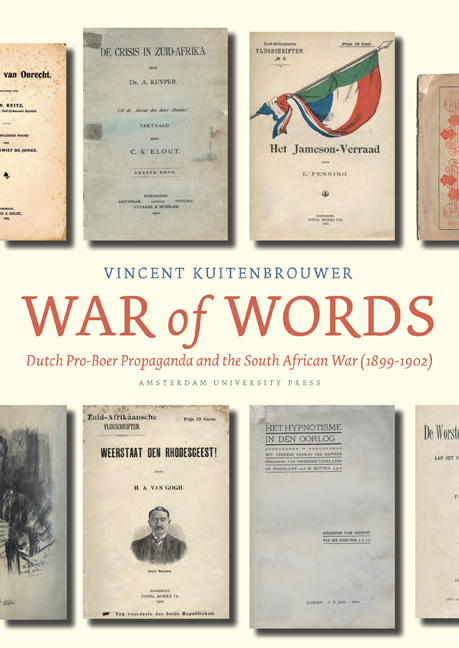Chapter 4 - ‘A Campaign of the Pen’: The Dutch pro-Boer Organisations
Published online by Cambridge University Press: 15 January 2021
Summary
When the South African War started in October 1899, a wave of pro-Boer enthusiasm rippled through the Netherlands, greater than ever before and, for a while, support for the embattled republics dominated public life. In November 1899, Amsterdam was all abuzz with false rumours that the Boers had defeated the British army. At times, people even went out into the streets to celebrate this ‘victory’, infecting others with their enthusiasm. On one occasion, a huge crowd gathered at the Rembrandtplein for a spontaneous celebration: flags of the Boer republics were everywhere and the Transvaal anthem was sung heartily. Although the feverish enthusiasm cooled somewhat later, people continued to sing songs in the streets in which they celebrated the Boers for their heroism and denounced British cruelties throughout the war. Advertisements from the time reveal the great popularity of the Boer leaders, several of whom literally became brand names. Paul Kruger's name, for instance, became attached to items such as beer, lemonade, tobacco, pipes and wallets. These examples show that the South African War prominently featured in Dutch popular culture, but it remains to be seen what effect these phenomena had on society in general. As will be discussed in this chapter, this is not only a question for historians: contemporaries also tried to grapple with it.
In historiography, much emphasis is placed on the official policy of neutrality that was adhered to by the Dutch government, which was pursued with even more rigor during the war. To ensure the integrity of the Netherlands’ colonial possessions in the Indonesian archipelago, which bordered on the British Empire in Asia, it was considered of vital importance that incidents be avoided. The general public did not always share this view, and throughout the war there were loud complaints about the cautious official stance taken by the Netherlands. In this sense, the Dutch government was caught between a rock and hard place. On the one hand, it was concerned about how pro-Boer propaganda might endanger its relations with Great Britain, but on the other hand it had to take into account the sentiments of the domestic population, which were exploited in Parliament by the opposition leader, Abraham Kuyper.
- Type
- Chapter
- Information
- War of WordsDutch Pro-Boer Propaganda and the South African War (1899–1902), pp. 143 - 178Publisher: Amsterdam University PressPrint publication year: 2012



